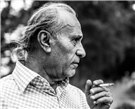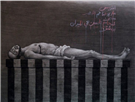[Amal Dunqul (1940-1983) was part of what is known as the "sixties generation" of Egyptian poets and one of the most significant (political) poets of modern Arabic literature who remains largely untranslated. Dunqul was born in Upper Egypt, and like many writers, migrated to Cairo from the countryside. He wrote six collections of poetry, apart from dispersed poems which were collected in his Complete Works after he tragically died early due to complications of cancer. He was most well-known for his political poems that drew upon ancient stories whether from pre-Islamic lore, or biblical legends from the old and new testaments to speak about the contemporary reality that he lived in. The most famous of these is La Tusalih [Do Not Make Peace] written just before the Camp David peace treaty, in intuitive anticipation of Sadat’s compromising settlement with Israel.
Spartacus` Last Words, another of his most well-known poems, is from his first collection, al-Buka’ Bayna Yaday Zarqa’ al-Yamama [Weeping Before Zarqa’ al-Yamama (a legendary woman soothsayer in pre-Islamic Arabic lore)], published in 1969, although the poem was composed earlier around 1962. The poem is divided into four parts that Dunqul titles amzaj (sing. mazj) which are closest to "movements" in the musical sense of the word, giving us the sense of a carefully crafted symphony or operetta of which Spartacus is the narrator. The poet speaks in the voice of the Roman slave Spartacus, who led a failed rebellion against the Roman empire around 70 BC, as he is about to be hanged. I would like to thank Sinan Antoon and Gaelle Raphael for their invaluable help to me in translating this intricate yet immensely rewarding poem.]
Spartacus’ Last Words
Amal Dunqul
First Movement
Glory to Satan, god of the winds
Who said no to the face of those who said “yes”
who taught Man to tear apart nothingness
He who said no, thus did not die
And remained a soul eternally in pain
Second Movement
I hang from the morning’s gallows
My forehead lowered by death
Because alive, I did not lower it!
O My brothers who are crossing the plaza
Heads hung in silence
Descending at evening’s end
Towards Alexander the Great Street:
Do not be ashamed…Raise your eyes to me
Because you are hanging alongside me
On Caesar’s gallows
So raise your eyes to me
Perhaps…if your eyes met with death in mine
The void inside me would smile…because just once,
you raised your head
Sisyphus no longer has the rock on his shoulders
Those born in the slaves’ quarters are carrying it
The sea, like the desert, does not quench thirst
For he who says “no” drinks his fill only of tears
So raise your eyes to the hung revolutionary
Tomorrow you will end up like him
Kiss your wives here,
In the middle of the open road
For tomorrow you will end up right here,
It is bitter to bow down
And the spider spins its web of death over men’s necks
Kiss your wives then…I left my wife without saying goodbye
Should you see my child, whom I left on my wife’s arms
Without an armTeach him to bow down
Teach him to bow down
God
Did not forgive Satan’s transgression
When he said no
The meek and good-natured
Shall inherit the earth
When all is said and done
They shall inherit the earth
Because they
Are not hung!
So teach him, then, to bow down
For there is no escape
Dream not of a happy world
For behind every dying Caesar
There is a new one
And behind every dying revolutionary
There are futile sorrows
and a tear in vain
Third Movement
O Great Caesar! I have indeed transgressed
I do admit it
Here on my gallows, let me kiss your hand
I kiss the rope
wrapped around my neck
For it is your hand, and your glory
Which compels us to worship you
Let me atone for my transgression
Let me grant you
After my death
My skull
Which you can mould into a cup for your strong wine
And if you do as I wish
Should they ever ask you
about my martyred blood
whether you granted me life just to snatch it away from me?
tell them he was not resentful towards me when he died
and this cup
made from the bones of his skull
is my absolution
My killer!
I have pardoned you
The moment after you were relieved of me
I was relieved of you!
Still if you wish to hang everyone
take my advice:
have mercy on the trees!
Do not cut their trunks
and erect them as gallows
perhaps the spring may come
this year of hunger
you will not smell the fragrance of fruit
on branches
Perhaps the dangerous summer
may pass through our land
You will cross the desert
In search of shades
You will see only the searing afternoon heat and sands
and the fiery thirst between your ribs
O Lord of white tombstones in the twilight
O Caesar of frost!
Fourth Movement
My brothers who cross through the square
Bowed down
Descending at evening’s end
Dream not of a happy world
For behind every dying Caesar
There is a new one
And if on the way
you see Hannibal
tell him that I waited for him
at Rome’s rundown gates
While - beneath the Victory Arch
Rome’s patricians awaited
the conqueror of heroes
and the women of Rome
between the gaudy decorations
stayed awaiting the arrival
of the Atlas-headed soldiers crinkled hair
But Hannibal’s soldiers never came
Tell him, then -
I waited for him…
But he did not come!
I waited for him
until I ended up in death’s noose
And in the distance
Carthage is in flames
Carthage was the sun’s conscience
and has learned what it means to kneel
the spider is on top of men’s necks
and words are choking
My brothers: Carthage the Virgin is in flames
Kiss your wives then…I left my wife without saying goodbye
And should you see my child, whom I left on my wife’s arms
Without an arm
Teach him to bow down
Teach him to bow down
Teach him to bow down
* * *
[Translated from the Arabic by Suneela Mubayi]
![[Amal Dunqul (1940-1983). Image from Wikipedia]](https://kms.jadaliyya.com/Images/357x383xo/Dunqulscreen.jpg)










